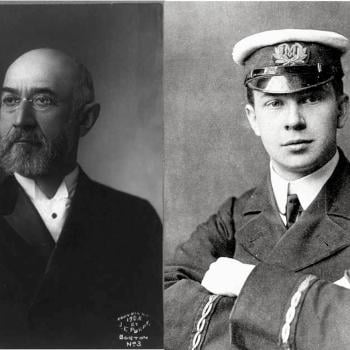That history, and a strong perception that America at present under the leadership of President Obama did not understand the issues, was a source of tension for the group. This played out in various ways. As someone who teaches a course called Religious Right in America, I asked many of our speakers, religious and non-religious alike, how Israel could welcome support from Christian organizations on the right, such as CUFI, Christians United For Israel, lead by the Rev. John Hagee? The support is not merely a promotion of the Israeli political cause, but support that issues from specific religious beliefs; namely, a particular reading of the Book of Revelation that makes Israel, Jews, and Jerusalem a centerpiece of fulfilling prophecy for the second coming of Christ.
The answers were, for the most part, pragmatic. Either people did not understand that the Battle for Armageddon would mean they needed to convert to Christianity in order to be saved, or they believed that support in the present was worth a lot more than trying to figure out dispensational theology. Given this pragmatism, I began to understand a bit why the previous administration was held in high esteem, while the current administration was viewed with skepticism from some quarters in the government. For my part, it made the issue of Iran even starker. True, Ahmadinejad is not exactly the most likeable or trustworthy leader in the region for a variety of reasons, but when he might fit the bill for fulfilling evangelical and fundamentalist Christian beliefs in end time prophecy, where does that leave Israel?
The second piece, which dovetails with the skepticism and mistrust of President Obama, was the issue of settlements. I think that it was difficult for some of our hosts who were unfamiliar with the history of African Americans to understand why it might be easier for them to identify with the Palestinian plight. The land grabs and lynchings of African Americans during the Reconstruction and Jim Crow periods seemed close to the issue of settlements and repatriation of land for use by Israeli settlers.
These conversations would prove the most charged and touchy. From driving through and looking at established settlements from vantage points, to hearing the wrenching story of a young Israeli mother from Sderot who experienced violence from the shelling and missiles, our group asked questions and attempted to absorb the issues. One could be appreciative and sympathetic to the violence she had experienced, along with her young children. Yet even in our visit to Efrat, where we heard from Rabbi Dr. Shlomo Riskin, founding chief rabbi of Efrat, it was hard not to remember, at least for me, that the land we were on was once Palestinian land.
All of this culminated in perhaps the most heated conversation of the trip, which occurred with the editor of the Jerusalem Post, David Horovitz. In retrospect, I think his frank discussion of the mainstream mistrust and the "naïveté" of President Obama, opinions held by many in the political and social arena of Israel, was a foreshadowing of the just released poll conducted for the Jerusalem Post in which 51% of Israelis believed that Obama was more pro-Palestinian than pro-Israeli.
Many in the group I traveled with reacted very strongly to the assertions that President Obama had been naïve, whether in reaching out to the Muslim world, in measuring the degree of extreme hostility that exists toward Israel in the Arab world, or in the current policies toward settlements. It was difficult for our group to hear those assertions of Horovitz's depiction of mainstream Israeli perceptions. What came out of that conversation, heated, but revelatory, was a better understanding of why there were several George Bush memorial parks and a sense that even though the relationship between the United States and Israel may be problematic, it is an important one. But as Horovitz said, the more you delve into the Israeli issue, the less clarity you have.
Having been back a month from this trip, I would have to agree. Israel's political future is tied to a religious past, present, and future. It is difficult to assess all of my experience since it was incomplete -- I needed to visit the Palestinian territories so that I could have something to compare. After all, we could not even visit Bethlehem with our hosts. The Dome of the Rock remained tantalizingly close, but far away, even when I could see it from the bus, or from the Old City. The religious, social, and political divides seem to be great in this tiny nation that you can cross in a day.
For all of the focus on peace, politics, freedom, defense, or economic endeavor, I believe the crux of all of these issues will always have a religious dimension to them. If the peace process has any chance at all, it may be in the recognition that it is not only a political dilemma, it is a religious one. Jerusalem will always be a place of great reverence for Judaism, Christianity, and Islam. Let us hope that one day, for everyone, it will also be a city of peace.





